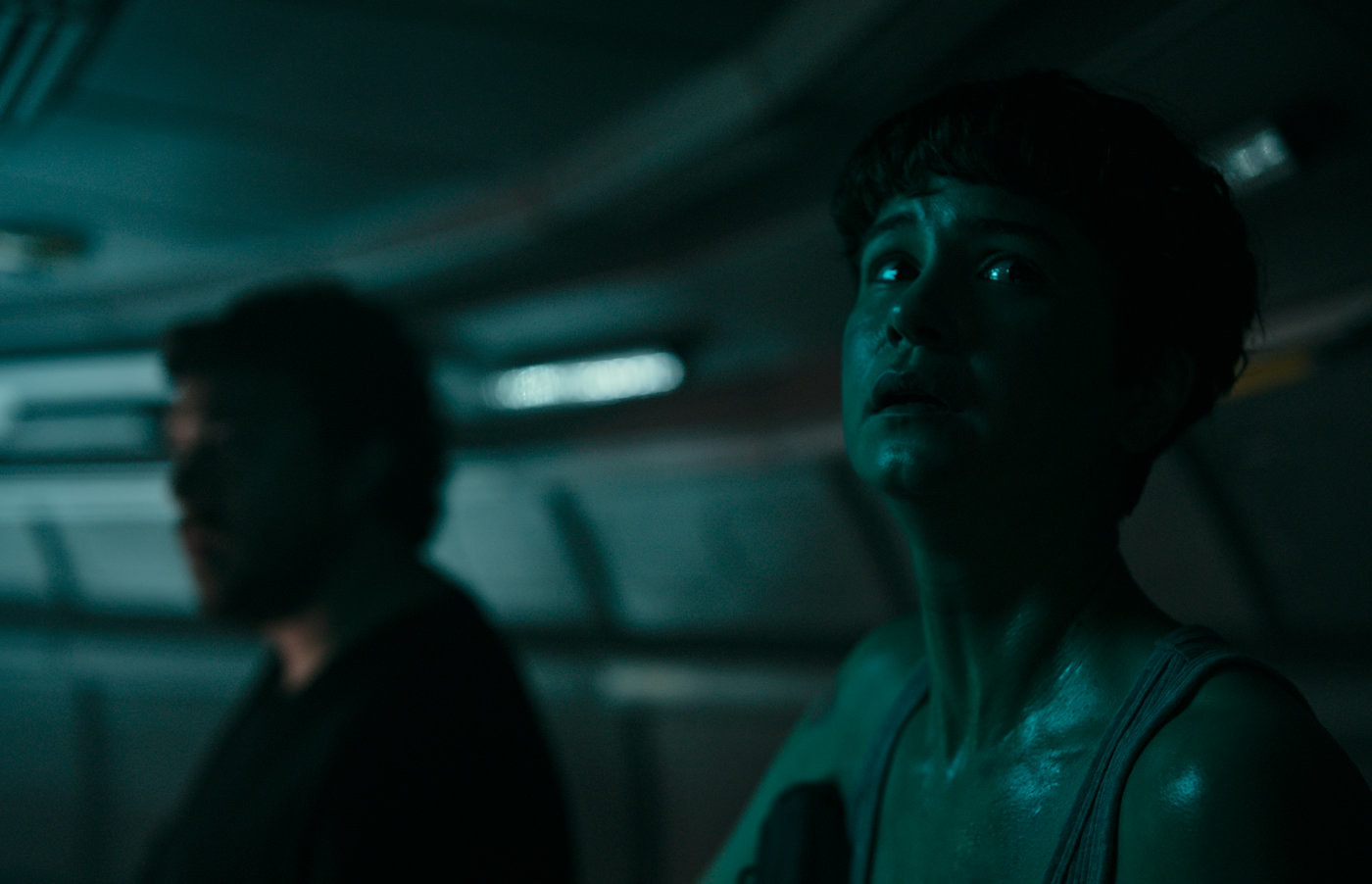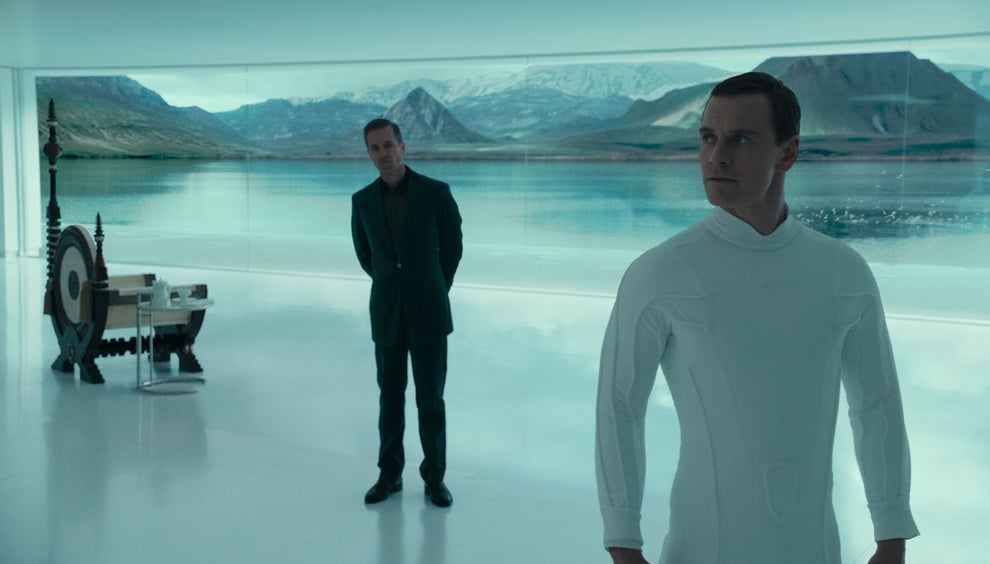
Katherine Waterston as Daniels in Alien: Covenant Mark Rogers / Twentieth Century Fox
Katherine Waterston plays a character named Daniels in Alien: Covenant, the second in director Ridley Scott’s series of Alien prequels that began with 2012’s Prometheus. Daniels is a new character with some familiar touches: She’s a crew member on the Covenant, a spaceship containing terraforming equipment and 2,000 colonists suspended in hypersleep, bound for a planet on which the workers and passengers hope to establish a unspoiled home together.
“Like pioneers,” she says, citing her husband’s description of the future they’ve embarked on. The crew consists mainly of couples, on a journey only meant to be one-way — though their shared dream starts going terribly wrong almost immediately.
Nevertheless, Daniels persists, through a briskly brutal personal tragedy and having her opinion overruled by the ship’s freshly minted captain, Oram (Billy Crudup), in what turns out to be a fateful decision to set down early and suss out whether a suspiciously perfect planet that’s much closer than their original destination could be a place for them to settle.
Competent, capable with heavy machinery, crop-haired, and continually overruled by querulous men? Daniels bears all the marks of being Alien: Covenant’s knockoff of Ellen Ripley, the action lead played by Sigourney Weaver in the first four Alien films and a landmark heroine against whom few have measured up.
The less-than-distinctive Daniels doesn’t come close to Ripley’s iconic arc as an inadvertent warrior, in the same way that Noomi Rapace’s Dr. Elizabeth Shaw fell short when she was set up to invite the same comparison in Prometheus.
But the more Alien: Covenant unfurls of its great, grim story, the more these evocations of a stronger, more compelling character start to feel intentional, like it’s a feature and not a bug. Like, maybe Daniels isn’t as compelling as Ripley because she was never meant to be, because she’s not the hero of this story. Maybe it’s not the humans, flailing their way through the discovery that the misty, pristine-looking planet they stumbled upon is actually a very bad place on which to land, to whom Alien: Covenant belongs.
Alien: Covenant — written by John Logan and Dante Harper — is, like all of the Alien films, a survival saga about a tenacious individual dealing with a rapacious life form intent on spreading itself across the universe. But at its center isn’t Daniels but David, the android aesthete introduced in Prometheus and played again in Alien: Covenant by an extraordinary Michael Fassbender.
It’s David who dramatically turns up on the new planet, revealing himself to have been stranded for years after he and Shaw made their way there in a borrowed spaceship at the end of Prometheus, camping out in the ruins of an Engineer city. If anybody is an answer to Ripley in these prequels, it’s David. And the invasive species — well, that would be us.
Scott’s 1979 haunted-house-in-space movie Alien and James Cameron’s brawnier 1986 Aliens (and their less reliable follow-ups) are movies about human perseverance in the face of a perfect predator, a nightmare creation capable not just of killing but of implanting itself in someone — of turning a living body into an incubator and a carrier of what’s essentially a weapon. These films were celebrations of the strength of this regular woman and her ability to be not impervious to terror, but able to act in spite of it.
They made you invest in their collection of mostly doomed characters, something Alien: Covenant and, in a less clear way, Prometheus never ask of the audience. Alien: Covenant characters are also mostly doomed, destined to get offed in vividly disgusting ways, but they’re treated, almost impatiently, as fodder.
Or maybe it’s more accurate to say that they’re considered at a curious, cruel remove, like a kid burning ants with a magnifying glass. In Alien: Covenant, all the displays of emotion typically used as a way to bring us closer to the characters onscreen instead play as distancing irritants. The crew members’ insecurities, fears, and love for one another seem to inevitably drive them into unsound decisions, like dragging an infected colleague back to the ship for treatment.
Guy Pearce as Peter Weyland and Michael Fassbender as David Twentieth Century Fox
The film’s main plot begins with a baker’s dozen or so of the crew, with Demián Bichir, Carmen Ejogo, Danny McBride, Amy Seimetz, and Jussie Smollett among the actors playing them, and the die-off starts almost immediately, not all of it due to extraterrestrial causes. They’re forever courting oblivion with their bold acts of faith, their insistence on taking care of the hurt instead of leaving them behind, and their poorly timed canoodling. Their messy humanity comes across as so inefficient.
From the point of view of a synthetic — a humanoid robot — like David, it is. And it is, tellingly, David with whom Alien: Covenant begins, in an Earthbound flashback in which Peter Weyland (Guy Pearce) awakens his newly created synthetic and tells him about his desire to find meaning behind mankind’s creation. David responds that he doesn’t share these questions, given that his creator is in front of him, and that he isn’t able to share Weyland’s experiences with mortality either.
“You will die, I will not,” David says, a factual observation, but nothing the god complex–suffering Weyland Corp CEO wants to hear. Displeased, he demands David bring him some tea — a reminder that David was built in some ways to be superior to mankind, but also to serve and not outdo it.
And yet David is still too close to human — “too idiosyncratic,” in the words of Walter, another android played by Fassbender, who takes care of the crew on the Covenant. “You disturbed people,” Walter tells David in one of their scenes together, which are consistently the best in the film.
Walter is a more recent model of synthetic who has intentionally been made more robotic — he grinds his vowels a little, in one of the more convenient ways of telling the two apart. Walter is David, lessened, reined in, neutered in order to be less threatening to the species that created him. David — grandiose and effete and quite possibly a little mad from his experiences of use and isolation — has no such limitations.
Prometheus netted Scott criticism for his shift from a story about monstrous extraterrestrials to one about mythology and the origins of mankind (with the occasional monstrous extraterrestrial); he appeared to be attempting to respond to questions no one seemed to be asking. But the stronger, bleaker Alien: Covenant clarifies Scott’s grander vision for these films, and in particular his themes about the relationship between creators and the created.
Prometheus and Alien: Covenant are films about faith, both by way of the religiousness expressed by characters like Shaw and Oram, and via Weyland’s more science-filtered insistence that there must be a purpose to humanity — and a way to extend its existence. Weyland in particular is so presumptuously certain that his makers would welcome and assist him that he doesn’t really hear the point that David makes to him in Alien: Covenant’s opening sequence: that David has already met his maker, and that it wasn’t all that fulfilling.
There are no benevolent gods in Alien: Covenant, and no answers coming — at least not from the Engineers, that enigmatic, highly advanced race shown to have been responsible for humanity’s development in Prometheus. There’s only creation, which is an act of individuality and of ego. Maybe it’s because Alien: Covenant is the work of an older filmmaker revisiting his past, but there’s an embittered, amusing outrageousness to both Alien: Covenant’s terrible beauty and the way Scott flips around his established classic, with its admired heroine, surrounding it in a context of epic human effrontery.
It’s an Alien movie for our times, one in which mankind isn’t just under the thumb of an oppressive corporation but sewing the seeds of its own destruction on a more sweeping scale. When a xenomorph, in its classic form, finally does make an appearance in Alien: Covenant, we see it not from a horrified human perspective but from the clinical point of view of a synthetic. It’s a forebear of doom, but it also feels like a dark moment of triumph.



